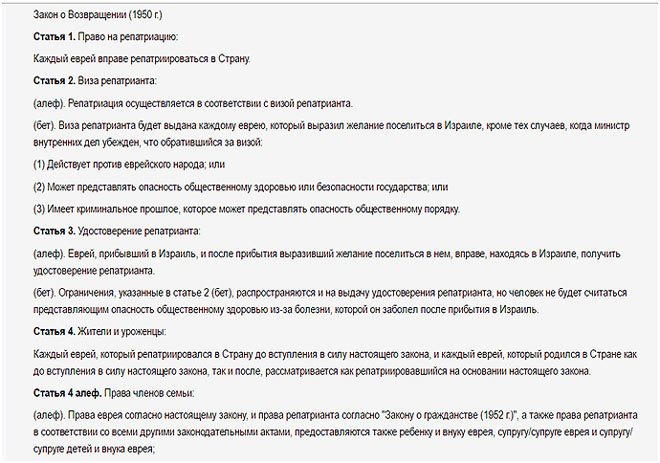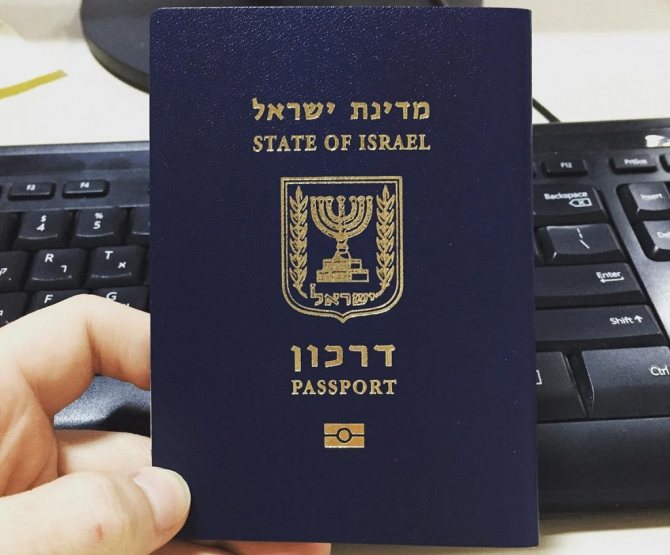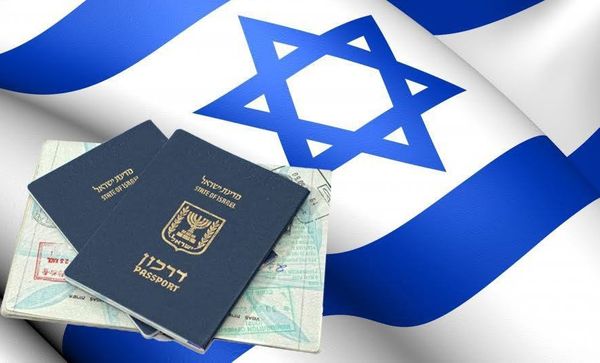- Possibilities
- Conditions
- Methods
- Procedure
- Documentation
- Deadlines
- Price
- Advantages and disadvantages
Israeli citizenship is a status that gives a person the opportunity to be part of a state with a highly developed economy, social protection, one of the best medicine in the world, an excellent climate and well-paid jobs.
An Israeli passport is a document thanks to which a citizen of this country has the right to all the privileges of Israeli life, as well as to visit about 150 countries without a visa. This list includes all Schengen countries, Great Britain, New Zealand and many others. A simplified procedure for obtaining a US visa is also available for Israelis, which immediately opens for 10 years.
What does Israeli citizenship provide?
Despite the fact that the country is quite controversial and has its shortcomings, Israeli citizenship has remained in demand for many years among residents of Russia, Ukraine, Belarus and many others. An Israeli passport gives its owner a lot of advantages:
- Economic stability of the state.
- Working conditions and pay in Israel are among the best in the world. In addition, having Israeli citizenship, an applicant for a vacancy will be considered first of all - according to the law, nationals of the country have priority.
- Visa-free border crossings of almost 150 countries. Among others, this list includes the Russian Federation and Ukraine.
- Free training opportunity.
- High level of medicine, especially surgery and childbirth.
- Social protection, subsidies and benefits.
- Pleasant climate and wonderful ecology.
- Many immigrants from post-Soviet countries already live in Israel, so it will not be difficult for a newly-made holder of a Jewish passport to adapt and find friends.
- A repatriation program is supported, according to which there is no need to renounce previous citizenship.
Do you want to get EU citizenship in 12 months? Take the free test and find out your chances.
Who can get a Jewish passport?
First of all, Israeli citizenship is granted to those who are Jewish by blood. It is believed that Jewish blood is transmitted through the mother, so if a person’s mother, grandmother or great-grandmother is or was Israeli by nationality, he can definitely apply for citizenship under the repatriation program. Only family ties up to the third degree are taken into account. The same principle applies to relatives along the male line - if the father is Jewish or the grandfather or great-grandfather was of Jewish nationality, then the chances of obtaining Jewish citizenship are high, since the right to citizenship, unlike nationality, is transmitted through both the mother and the father.
Those who are not Jewish by blood, but are related to them, can also count on an Israeli passport. The general list of those who have the right to apply for Israeli citizenship based on kinship looks like this:
- Children, grandchildren, great-grandchildren.
- Spouses, spouses of children, spouses of grandchildren.
- Adopted by Jews or their children.
- Widows and widowers of Jews, their children and grandchildren.
People who have Jewish blood and voluntarily changed their religion are not allowed to receive an Israeli passport by kinship. This rule also works in the opposite direction - a non-Jew who has undergone the conversion procedure has the right to obtain citizenship on the same basis as repatriates.
The list of how to obtain an Israeli passport includes naturalization. In this case, you will have to renounce your previous citizenship and you must live legally in the country for 8 years - 3 on the basis of a residence permit and another 5 for permanent residence. In case of marriage with an Israeli citizen, this period is reduced to 5 years.
Everyone can apply for Israeli citizenship, but on different grounds. Those without Jewish relatives can rely on the naturalization process.
Who can get the status
When can you obtain citizenship through an embassy?
Most countries do not have many requirements for people wishing to obtain citizenship, but this, unfortunately, cannot be said about Israel. Therefore, a Russian person who does not have Jewish roots has little chance of obtaining citizenship. To do this, you must have a relationship in one of the degrees (children, grandchildren, widows, spouses or adopted descendants of Jews).

Law of Return (1950)
If we talk about the great-grandchildren of Israelis, they are no longer included in the list of legal applicants, which is due to the Law of Return adopted more than 60 years ago. The state is still guided by it. The basis can only be the blood relationship of the applicant, therefore the presence of real estate in Israel or a long stay there contributes to obtaining citizenship, but is in no way considered a legal basis for this.
It is worth noting that Jewishness in this country is transmitted not through the father, but through the mother, therefore, in Israel, the descendants of men who are citizens of this country are not considered full-fledged Jews. But they still have the right to repatriation and, as a result, obtain Israeli citizenship.

Israeli passport
Conditions for obtaining Israeli citizenship
The conditions for obtaining an Israeli passport depend on the reason for obtaining it. For example, for repatriation the main requirement is the presence of Jewish roots. The general conditions are:
- Religion - acceptance of Judaism, is mandatory for repatriates and desirable for everyone else.
- Knowledge of Hebrew.
- Integrity – no problems with the law, no criminal record.
- Financial security - a new member of society should not sit on the neck of the state, he must work, have housing and contribute to the development of the country.
In case of acquiring citizenship through naturalization, the applicant is required to:
- Been in permanent resident status (permanent residence) for at least 5 years.
- Willingness to renounce previous citizenship.
- Confirmation that the applicant's entire life is now in Israel and not in any other country.
Contacting the consulate
After collecting the evidence base, the next step is to visit the consulate. In Russia, consulates are located only in Moscow and St. Petersburg. In order for you to be able to prove the possibility of obtaining citizenship through the repatriation program, a personal interview with an official of the diplomatic department is necessary. If for some reason it is not possible to come to the capital or Northern Palmyra, then there is the option of waiting for the consul to arrive in a large city located near your place of residence. You can clarify the movement schedule by calling or going to the official website of the department.
This is important to know: Moving to Sweden for permanent residence: obtaining a residence permit and obtaining citizenship
Before going to an interview, you must first make an appointment. You will be notified about the date of your visit.
You need to arrive for the interview in the morning, as this is a slow event. Before going to the consul's office, you will need to fill out a special detailed questionnaire. Diplomatic staff will always provide advice.
After the form with questions is filled out completely, you will be invited to the consul. The main time of the interview the official will study the presentation of documents. He will also ask about your future plans for life in Israel and your attitude towards religion. As a rule, rarely does anyone pass an interview the first time. Usually the consul schedules a second meeting, for which he asks to prepare the missing documents.
Methods of immigration to Israel
It is possible to immigrate to Israel and obtain citizenship of this country, the main thing is to decide on the method of obtaining it. This could be repatriation, conversion or naturalization, which includes many options. All methods will be described in more detail below. As for choosing a method, you should first of all look for the presence of Jewish roots or relatives - if they exist, then there is no point in considering other options. If there are none, then you should ask yourself about your readiness to undergo the conversion procedure. If this option seems unacceptable, then naturalization remains, the method of which must be selected based on personal plans.
Repatriation
As mentioned above, those who have Jewish roots up to the third generation, and are also a widow or widower, spouse or adopted child of an Israeli or descendant can obtain Israeli citizenship by repatriation. However, no one will take your word for it that there is a relationship; documentary evidence must be provided. And this is where difficulties usually begin. If it is not so difficult to prove kinship, then confirming the nationality of an ancestor is more difficult.
In all Soviet documents there was always a column about nationality. It would seem that it is enough to find documents of an ancestor indicating that he is a Jew. However, in the USSR there was an unspoken law prohibiting Jews from holding a number of positions, so the Israelis changed their surnames to Russian or Ukrainian ones, and tried to get rid of old documents. In addition, documents may be lost due to repression, persecution, discrimination and the Holocaust. Situations often occur when a true Jew, who has the right to return upon repatriation, simply could not find documentary evidence of origin and was denied Israeli citizenship.
Still, it's worth a try. First you need to look for papers in the family archive, at home with the older generation. Often there is a box of documents at home that no one looks into; usually important papers are kept there. If nothing useful was found, you need to contact the registry office, archives, especially those located at the place of residence or registration of the ancestor. You can contact lawyers, they will help speed up your search.
After collecting all the papers that could be found, you need to go to the embassy and make an appointment. After the interview, the consul will immediately announce the decision. If it is positive, the applicant has six months to complete all matters and move to Israel. Upon arrival, he is given a new passport. The repatriate can be accompanied by his family, who are also entitled to Israeli citizenship. Thus, obtaining a passport is possible without living in the country for eight years.
Family restoration
This country is known for valuing family and kinship, and therefore encourages citizens to invite their relatives to Israel. Those who have parents, siblings, aunts or uncles living in Israel and holding Israeli citizenship can be reunited with family quite easily, especially if a Jewish relative needs care. But each case is considered individually; it is a kind of lottery.
Conversion
Conversion is a ritual that allows a non-Jew to become a Jew. For men, it consists of two stages: circumcision and dipping. Women only pass the second. The ritual is simple, but requires thorough preparation:
- Studying Judaism, better with a teacher
- Study of prayers, commandments, traditions
- Finding friends in the Jewish community and presenting yourself as someone who really wants to become a member
- Not only know the commandments of the Torah, but also live by them
- Change of appearance: women must cover their hair and refuse bright clothes, men must wear a hat, dark clothes and forget about the existence of a razor
- Passing the exam to obtain permission to perform the ceremony

The whole process takes from a year to three, or even more. The candidate's readiness is determined by the rabbinical court. After completing the ceremony, permission to obtain citizenship is issued. The process of obtaining Israeli citizenship is similar to the procedure for repatriation: collecting papers, applying at the consulate, waiting for an interview.
Naturalization
This method of obtaining Israeli citizenship is suitable for non-Jews. In order to be eligible for a new passport, the applicant must have lived in Israel for at least 8 years legally. Such a basis is work, education or marriage, the latter has its own characteristics.
The first step is to obtain a residence permit. It comes in different types: for 12, 36 or 60 months. A residence permit, as well as subsequently permanent residence, for naturalization is issued in the following cases:
- An invitation to work from an Israeli employer.
- Admission to the University.
- Arrival as a rabbi or his student.
- Marrying a Jew.
After three years, the applicant has the right to obtain permanent residence, and after another 5 years, citizenship. In addition, the future new citizen must:
- Do not leave the country’s borders for an extended period for 3-5 years.
- Know Hebrew at least at a minimum level.
- Have income and housing.
- Renounce your first citizenship.
If all requirements are met, the applicant must submit documents to the Israeli Ministry of Internal Affairs, where he will undergo an interview. The Ministry will announce its decision later.
Marriage
As mentioned earlier, marriage is one of the ways of naturalization, but Jewish spouses can obtain citizenship faster. In total, to obtain an Israeli passport, the applicant must live legally in the territory of his Jewish spouse for at least five years, one year on the basis of a residence permit and four years on permanent residence. For five years, government officials have been visiting the family to check whether the marriage is fraudulent. During inspections, housing is inspected, individual interviews are conducted with spouses, and then their responses are compared. They can interview neighbors, relatives, and friends. A plus for the couple will be the provision on their part of additional evidence of the authenticity of the marriage, this could be recent joint photos, for example.
Another option is to marry a Jew who is preparing for repatriation. In this case, it is enough to live together for a year, then when one spouse receives citizenship, the second automatically becomes an Israeli citizen.
other methods
Other methods include business immigration, refugee, and special services to the state. In Israel there is no separate program for investors, but based on the opening of a company with new jobs, you can be guaranteed to receive a residence permit for a year with the right to extend. Also, this country does not really like refugees, but those who are truly in serious danger will be helped by the authorities. Honored athletes, doctors and politicians can also count on citizenship if their achievements are very valuable to the state.
Do you want to get a guaranteed second citizenship? Check out the rating of reliable migration companies!
Marriage
Obtaining citizenship by marriage is a more complicated way to become legalized in Israel. If the marriage is more than 5 years old, then there will be no problems with obtaining citizenship. Both spouses are repatriated.
If the marriage is less than 5 years old, then some difficulties may arise. This can happen if the consul at the interview has doubts that the marriage is real.
In this case, the spouse of a person of Jewish nationality is not issued citizenship, but a residence permit. With this document, a person has exactly the same rights, although in a somewhat “truncated” form.
5 years after marriage, if people do not get divorced, then the consul does not have any formal grounds for not giving the applicant Israeli citizenship.
Who can obtain citizenship
Spouses of persons of Jewish origin can obtain Israeli citizenship. Marriage can be concluded in any country.
Expert Video: Attorney Eli Gerwitz answers important questions regarding obtaining Israeli citizenship.
Features of marriage in Israel
Marriage to an Israeli citizen is a more difficult path.
By law, marriages with foreigners are not registered in this country.
You can obtain Israeli citizenship through interfaith and intrafaith marriage. Permission to marry is issued by a religious court. Before obtaining permission, a religious affiliation check is carried out.
When the checks are completed, the young people are given a certificate that confirms their Jewishness.

After receiving the certificate, the newlyweds are allowed to formalize their relationship
“Glove marriages” are common – formalization of relationships in El Salvador. The required document is a power of attorney. Spouses may not attend the wedding ceremony.
If both future spouses are not religious and have additional citizenship of another country, then the marriage can be concluded on the territory of the consulate of that state. Israel recognizes such a marriage regardless of whether both spouses are Israeli citizens.
You can choose any country to get married. But in case of divorce, you will have to use the legislation of the country that registered the marriage.
If both spouses are representatives of the same religion, they will be divorced in a religious court, otherwise the Ministry of Internal Affairs will not recognize such a divorce.
Registration of citizenship through marriage
An Israeli citizen must contact the Ministry of Internal Affairs and issue an invitation for his wife. This is a special form. Notarization will not be enough.
In this invitation, the person must indicate that he can support his spouse for at least six months. After this, the invitation is sent to the spouse.
At the airport, a person with an invitation in hand is issued a tourist visa. Validity period: 3 months.
After 90 days, the foreigner needs to visit the Israeli Ministry of Internal Affairs and extend the visa at the consular department for another 3 months.
After this, the foreigner must once again visit the Ministry of Internal Affairs and apply for a work visa for six months. After this time, both spouses must again contact the Ministry of Internal Affairs and submit an application for citizenship.
Video: instructions for obtaining an Israeli work visa.
Documents to confirm marriage
To obtain citizenship, a non-Jew will need to provide:
- international passport;
- apostilled birth certificate;
- apostilled certificate from the Russian Ministry of Internal Affairs confirming no criminal record;
- apostilled certificate of marriage (original + 2 photocopies). The document must be translated into Hebrew;
- a completed application (the form can be obtained from the Israeli Ministry of Internal Affairs);
- 3 personal passport-type photos;
- joint photos with your spouse;
- description of dating history;
- letter from the housekeeper (vaad-bayta). The document must include the manager's last name, first name and telephone number;
- letters from acquaintances (friends) who are Israeli citizens. These letters should contain a brief description of both spouses and their marriage (an outside perspective on their relationship).
Obtaining permanent residence
Spouses of Israelis who have completed STUPRO have the right to obtain permanent residence. The process of obtaining permanent residence in Israel for couples who are officially married takes 5 years.
A foreigner can choose what he needs more – permanent residence or citizenship. For couples who have not formalized their relationship, the process is delayed for 7 years.
Step-by-step checks of a fictitious marriage union (stupro)
Another name for the procedure is “taalikh medurag”. During the procedure, all documents submitted by the spouses are checked for authenticity.
In 90% of cases, officials require translations of all certificates, translated into Hebrew and notarized.
At the next stage, the life of the spouses is studied. Stage 3 – interview.
How can non-Jews obtain Israeli citizenship?
In the absence of Jewish roots and relatives living in Israel, you will have to rely only on naturalization, which takes a lot of time and requires effort. There is also the opportunity to undergo conversion, but, as a rule, few people decide to do this.
The first step is to open a visa. They are of the following types:
- Tourist - a citizen of Russia and Ukraine will not need it; you can travel around the country for no more than 90 days. Working on this visa is prohibited.
- Tourist with the right to work. Provided for a year, can be extended up to five.
- Student – up to a year.
- Repatriate.
- For clergy.
- For spouses and children – up to one year.
The main requirements for applying for a visa are the absence of a criminal record and problems with the law, as well as the availability of finances for life and insurance.
After the visa expires, you can proceed to obtaining a residence permit on its basis. In essence, a residence permit is the same as a visa, only long-term. It is issued by the Ministry of Internal Affairs, the validity period is three years, in special cases it can be extended. The Ministry may require additional confirmation of financial solvency.
After three years of residence under a residence permit, you have the right to apply for permanent residence, the validity of which is unlimited. After another five years, you can apply for citizenship. All procedures are carried out at the Ministry of Internal Affairs. For those who married a Jew, the terms are reduced: to obtain a passport, you must live for 1 year under a residence permit and 4 years under permanent residence. It can take up to a year for your citizenship application to be processed.
Documents for obtaining Israeli citizenship
Depending on the method of obtaining a Jewish passport, the list of required documents may vary. Those undergoing the repatriation procedure need proof of relationship, this could be:
- Soviet documents of ancestors indicating nationality.
- Birth or marriage certificates.
- Diplomas and personal files from educational institutions.
- Extracts from house books.
- Documents about the burial of an ancestor in a Jewish cemetery.
- Military IDs.
The more evidence you can collect, the higher the chances of a positive answer.
The basic package of documents looks like this:
- Civil and foreign passport.
- Three color passport size photographs.
- Documents confirming the availability of finances for living.
- A document confirming the availability of living space in Israel.
- Medical certificate of health.
- Certificate of absence of problems with the law at home and in Israel.
- Insurance.
- Receipts for payment of administrative fees.
Depending on the situation, additional paperwork may be required. All documents must be translated into Arabic and Hebrew.
Features of obtaining citizenship
Israel is a country with a high population density (28th out of 189 countries). But the Jewish repatriation program still remains relevant and is of great importance for the state. People who took advantage of the Law of Return are provided with material compensation for adaptation to their historical homeland.

In order for the application for citizenship to be accepted, it is necessary to collect a basic package of documents. It includes:
- Photos that meet the required format;
- Passports;
- Documents confirming the fact of relationship with a family member applying with you to receive Israeli passports (marriage certificates, documents on the birth of children);
- Documents confirming the fact of receipt of higher or secondary specialized education;
- A certificate containing information about relatives living in Israel (full name, address, telephone);
- A document confirming that the applicant has no problems with the law.
This is important to know: Filling out an application for citizenship of the Russian Federation
The list of required documents is incomplete. During a consultation at the embassy or the Israeli Ministry of Internal Affairs, the official may ask to supplement the list with missing certificates.
Important! All prepared documents, if necessary, must be translated into Hebrew, and their copies certified with apostille stamps.
The prepared documents do not have to be presented to migration departments located in the country where immigration is planned. All certificates and official papers can be submitted to the Israeli consulate, for example, in Russia. If, after consideration of the application, the candidacy for repatriation is approved, then the migrant will be issued a special visa allowing him to come to Israel to acquire citizenship.
Important! The repatriation visa is valid for six months.
Pros and cons of Israeli citizenship
The advantages of being a Jewish citizen were already mentioned at the beginning of the article: visa-free entry into a large number of countries, highly paid official work, better medicine, subsidies, economic stability. Due to the current situation in the world, vaccinated citizens are now issued a special green passport - a mobile application, thanks to which you can go abroad and avoid self-isolation after contact with an infected person.
The disadvantages include:
- Those who are not repatriates will have to renounce their first citizenship.
- Citizens of military age are required to serve in the army, this also applies to women.
- An Israeli passport prohibits entry into almost all Arab countries.
- Prices in this country are higher than in Europe.
- A non-Jew is required to learn Hebrew before applying for citizenship.
Israeli citizenship, like any other, has its pros and cons, taking into account which the applicant must make a choice. If you have a clear intention to move to this country and become its full-fledged subordinate, then you should be prepared for a long search for documents, waiting for naturalization and other nuances. However, the standard of living that a new passport provides is worth the little effort.









